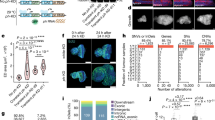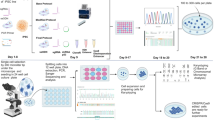Abstract
Microcephalin (MCPH1/BRIT1) is a potential tumour suppressor that localizes to the centrosome, forms ionizing radiation-induced nuclear foci (IRIF) and is involved in the DNA damage checkpoints that ensure genome stability. Here, we report the impact of Mcph1 disruption in the hyper-recombinogenic DT40 cell line. Mcph1−/− cells were viable and proliferated at the same rate as wild-type controls. Mcph1-deficient cells had intact G2-to-M checkpoint responses after ionizing radiation (IR) treatment, but showed moderate radiosensitivity. Light and electron microscopy indicated normal centrosome structures in Mcph1 null cells, but IR induced massive amplification of centrosome numbers in the absence of Mcph1. Mcph1 null cells formed γ-H2AX and Rad51 IRIF, but resolved them more slowly than wild-type cells. Mcph1 deficiency caused sustained Chk1 phosphorylation after IR, dysregulating Cdk2 activity. These findings show that Mcph1 controls centrosome numbers after DNA damage, which may indicate a novel tumour suppressive mechanism for microcephalin.
This is a preview of subscription content, access via your institution
Access options
Subscribe to this journal
Receive 50 print issues and online access
$259.00 per year
only $5.18 per issue
Buy this article
- Purchase on Springer Link
- Instant access to full article PDF
Prices may be subject to local taxes which are calculated during checkout




Similar content being viewed by others
References
Alderton GK, Galbiati L, Griffith E, Surinya KH, Neitzel H, Jackson AP et al. (2006). Regulation of mitotic entry by microcephalin and its overlap with ATR signalling. Nat Cell Biol 8: 725–733.
Bartkova J, Horejsi Z, Koed K, Kramer A, Tort F, Zieger K et al. (2005). DNA damage response as a candidate anti-cancer barrier in early human tumorigenesis. Nature 434: 864–870.
Bourke E, Brown JA, Takeda S, Hochegger H, Morrison CG . (2010). DNA damage induces Chk1-dependent threonine-160 phosphorylation and activation of Cdk2. Oncogene 29: 616–624.
Bourke E, Dodson H, Merdes A, Cuffe L, Zachos G, Walker M et al. (2007). DNA damage induces Chk1-dependent centrosome amplification. EMBO Rep 8: 603–609.
Brinkley BR . (2001). Managing the centrosome numbers game: from chaos to stability in cancer cell division. Trends Cell Biol 11: 18–21.
Brunk K, Vernay B, Griffith E, Reynolds NL, Strutt D, Ingham PW et al. (2007). Microcephalin coordinates mitosis in the syncytial Drosophila embryo. J Cell Sci 120: 3578–3588.
D'Assoro AB, Lingle WL, Salisbury JL . (2002). Centrosome amplification and the development of cancer. Oncogene 21: 6146–6153.
Dodson H, Bourke E, Jeffers LJ, Vagnarelli P, Sonoda E, Takeda S et al. (2004). Centrosome amplification induced by DNA damage occurs during a prolonged G2 phase and involves ATM. Embo J 23: 3864–3873.
Ganem NJ, Godinho SA, Pellman D . (2009). A mechanism linking extra centrosomes to chromosomal instability. Nature 460: 278–282.
Gorgoulis VG, Vassiliou LV, Karakaidos P, Zacharatos P, Kotsinas A, Liloglou T et al. (2005). Activation of the DNA damage checkpoint and genomic instability in human precancerous lesions. Nature 434: 907–913.
Jackson AP, Eastwood H, Bell SM, Adu J, Toomes C, Carr IM et al. (2002). Identification of microcephalin, a protein implicated in determining the size of the human brain. Am J Hum Genet 71: 136–142.
Jackson SP, Bartek J . (2009). The DNA-damage response in human biology and disease. Nature 461: 1071–1078.
Jeffers LJ, Coull BJ, Stack SJ, Morrison CG . (2008). Distinct BRCT domains in Mcph1/Brit1 mediate ionizing radiation-induced focus formation and centrosomal localization. Oncogene 27: 139–144.
Liang Y, Gao H, Lin SY, Peng G, Huang X, Zhang P et al. (2010). BRIT1/MCPH1 is essential for mitotic and meiotic recombination DNA repair and maintaining genomic stability in mice. PLoS Genet 6: e1000826.
Lin SY, Elledge SJ . (2003). Multiple tumor suppressor pathways negatively regulate telomerase. Cell 113: 881–889.
Lin SY, Rai R, Li K, Xu ZX, Elledge SJ . (2005). BRIT1/MCPH1 is a DNA damage responsive protein that regulates the Brca1-Chk1 pathway, implicating checkpoint dysfunction in microcephaly. Proc Natl Acad Sci USA 102: 15105–15109.
Liptrot C, Gull K . (1992). Detection of viruses in recombinant cells by electron microscopy. In: Spiers RE, Griffiths JB, MacDonald C (eds). Animal Cell Technology: Development, Processes and Production. Butterworth-Heinemann: Oxford, pp 653–657.
Loffler H, Lukas J, Bartek J, Kramer A . (2006). Structure meets function—centrosomes, genome maintenance and the DNA damage response. Exp Cell Res 312: 2633–2640.
Meraldi P, Honda R, Nigg EA . (2002). Aurora-A overexpression reveals tetraploidization as a major route to centrosome amplification in p53−/− cells. Embo J 21: 483–492.
Nigg EA . (2002). Centrosome aberrations: cause or consequence of cancer progression? Nat Rev Cancer 2: 815–825.
Peng G, Yim EK, Dai H, Jackson AP, Burgt I, Pan MR et al. (2009). BRIT1/MCPH1 links chromatin remodelling to DNA damage response. Nat Cell Biol 11: 865–872.
Rai R, Dai H, Multani AS, Li K, Chin K, Gray J et al. (2006). BRIT1 regulates early DNA damage response, chromosomal integrity, and cancer. Cancer Cell 10: 145–157.
Rai R, Phadnis A, Haralkar S, Badwe RA, Dai H, Li K et al. (2008). Differential regulation of centrosome integrity by DNA damage response proteins. Cell Cycle 7: 2225–2233.
Rickmyre JL, Dasgupta S, Ooi DL, Keel J, Lee E, Kirschner MW et al. (2007). The Drosophila homolog of MCPH1, a human microcephaly gene, is required for genomic stability in the early embryo. J Cell Sci 120: 3565–3577.
Takata M, Sasaki MS, Sonoda E, Morrison C, Hashimoto M, Utsumi H et al. (1998). Homologous recombination and non-homologous end-joining pathways of DNA double-strand break repair have overlapping roles in the maintenance of chromosomal integrity in vertebrate cells. Embo J 17: 5497–5508.
Tibelius A, Marhold J, Zentgraf H, Heilig CE, Neitzel H, Ducommun B et al. (2009). Microcephalin and pericentrin regulate mitotic entry via centrosome-associated Chk1. J Cell Biol 185: 1149–1157.
Trimborn M, Bell SM, Felix C, Rashid Y, Jafri H, Griffiths PD et al. (2004). Mutations in microcephalin cause aberrant regulation of chromosome condensation. Am J Hum Genet 75: 261–266.
Trimborn M, Ghani M, Walther DJ, Dopatka M, Dutrannoy V, Busche A et al. (2010). Establishment of a mouse model with misregulated chromosome condensation due to defective Mcph1 function. PLoS One 5: e9242.
Tsang WY, Spektor A, Vijayakumar S, Bista BR, Li J, Sanchez I et al. (2009). Cep76, a centrosomal protein that specifically restrains centriole reduplication. Dev Cell 16: 649–660.
Wood JL, Liang Y, Li K, Chen J . (2008). Microcephalin/MCPH1 associates with the condensin II complex to function in homologous recombination repair. J Biol Chem 283: 29586–29592.
Wood JL, Singh N, Mer G, Chen J . (2007). MCPH1 functions in an H2AX-dependent but MDC1-independent pathway in response to DNA damage. J Biol Chem 282: 35416–35423.
Wu X, Mondal G, Wang X, Wu J, Yang L, Pankratz VS et al. (2009). Microcephalin regulates BRCA2 and Rad51-associated DNA double-strand break repair. Cancer Res 69: 5531–5536.
Xu X, Lee J, Stern DF . (2004). Microcephalin is a DNA damage response protein involved in regulation of CHK1 and BRCA1. J Biol Chem 279: 34091–34094.
Yang SZ, Lin FT, Lin WC . (2008). MCPH1/BRIT1 cooperates with E2F1 in the activation of checkpoint, DNA repair and apoptosis. EMBO Rep 9: 907–915.
Acknowledgements
We thank William Tsang and Brian Dynlacht for the Cep76 antibody, Andrew Jackson and Andrea Robertson for the MCPH1 mutant lymphoblastoid cells, Tiago Dantas for help with the EM and Noel Lowndes for critical reading of the paper. CL was funded by the National Biophotonics and Imaging Platform funded by the HEA under PRTLI4. This work was supported by the Health Research Board project grant RP/2006/36 and Science Foundation Ireland Principal Investigator award 08/IN.1/B1029.
Author information
Authors and Affiliations
Corresponding author
Ethics declarations
Competing interests
The authors declare no conflict of interest.
Additional information
Supplementary Information accompanies the paper on the Oncogene website
Supplementary information
Rights and permissions
About this article
Cite this article
Brown, J., Bourke, E., Liptrot, C. et al. MCPH1/BRIT1 limits ionizing radiation-induced centrosome amplification. Oncogene 29, 5537–5544 (2010). https://doi.org/10.1038/onc.2010.302
Received:
Revised:
Accepted:
Published:
Issue Date:
DOI: https://doi.org/10.1038/onc.2010.302
Keywords
This article is cited by
-
Aging-induced MCPH1 translocation activates necroptosis and impairs hematopoietic stem cell function
Nature Aging (2024)
-
Analysis of the “centrosome-ome” identifies MCPH1 deletion as a cause of centrosome amplification in human cancer
Scientific Reports (2020)
-
Opposing effects of pericentrin and microcephalin on the pericentriolar material regulate CHK1 activation in the DNA damage response
Oncogene (2016)
-
Centrosomes in the DNA damage response—the hub outside the centre
Chromosome Research (2016)
-
Mcph1/Brit1 deficiency promotes genomic instability and tumor formation in a mouse model
Oncogene (2015)



